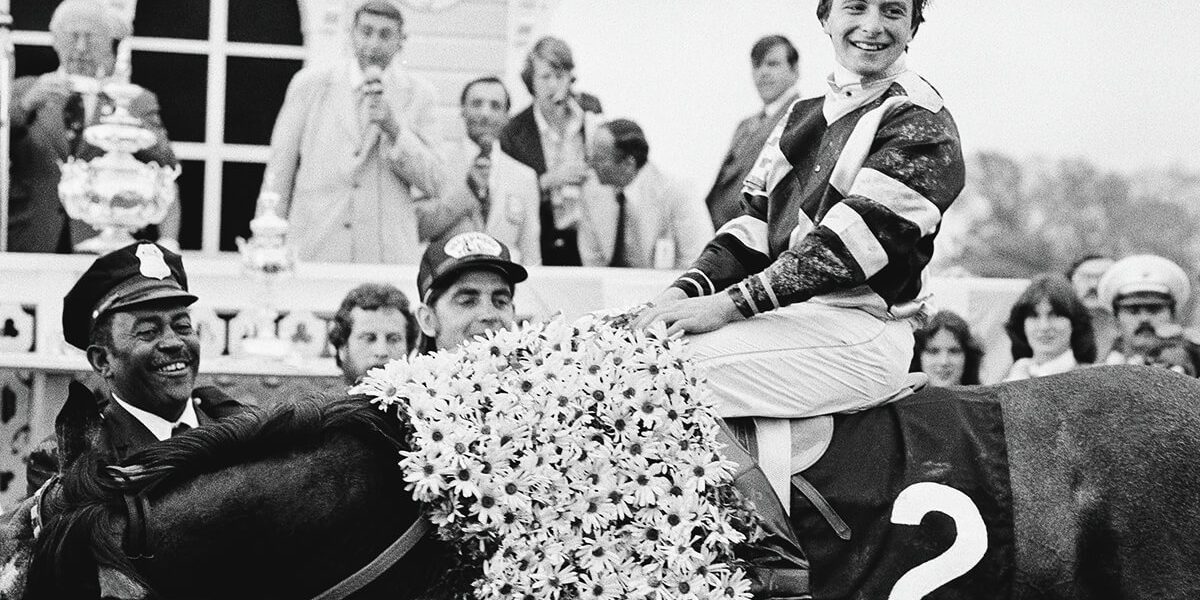History & Politics
The Bid & The Kid
In 1979, a 19-year-old kid from Dundalk rode Spectacular Bid to Preakness glory.
Gerald Delp liked Ronnie Franklin from the start. “He was small, but he didn’t take any shit from anybody, and he was funny,” the 56-year-old Delp recalls with a laugh. “He was from Dundalk, and I grew up in Laurel. We clicked. Just the way you do with some people.”
As teenagers, they shared a mutual love of horse racing, girls, partying, and skipping school. Delp had known since he was 7 that he wanted to follow in the footsteps of his dad, legendary trainer Grover “Bud” Delp, and he quit school after the ninth grade. Franklin had no interest in school, either, or a Baltimore factory job (in the mid-’70s, when such things still existed) and he quit Patapsco High and went to Pimlico looking for a job, even though he’d never been near a horse in his life. “I was 13 and Ronnie was probably 15 when we first met,” Delp says. “We began walking horses together.”
A few years later, 40 years ago this month, Delp’s father trusted the reins of a colt he called “the greatest horse ever to look through a bridle” to then 19-year-old Franklin, who rode the race of his life at the Kentucky Derby, rallying a slow-starting Spectacular Bid past six horses into the winner’s circle. In front of 72,607 at Pimlico, The Bid—owned by Baltimore builder Harry Meyerhoff—and The Kid did it again at the Preakness, producing two of the biggest moments in local sports history in the span of two weeks.
Franklin, who passed away last March at 58 from lung cancer, went on to win 1,403 races and $14 million in prize money during a 15-year career. “Horses liked to run for Ronnie,” says Walter Cullum, Franklin’s nephew and a former jockey. “You have to be fearless, and Ronnie was, and he was strong, but his gift was in his hands and the way he communicated with them. God-given ability.” Delp recalls a horse named Pioneer Patty, so tightly wound she’d climb the walls of her stall. “We put rubber padding around to protect her from herself,” he says. “She was Ronnie’s first mount. He rode her to five straight wins.”
Bud Delp had sent a green Franklin to the Middleburg Training Center for experience, and it was there that Franklin first developed a bond with Bid, a charcoal gray yearling. By that time, Franklin, the youngest of six, had moved in with Bud Delp, who was raising his two boys, Gerald and Doug, by himself.
The road to the Derby and Preakness was not easy for Franklin, however. With such little experience under his belt, he was pulled at one point off Bid, clearly a thoroughbred with the potential to be one of the sports all-time greats. “He’d eat twice as much as a normal horse, a sign he wanted to work,” Gerald Delp recalls. Franklin got the mount back when Bid didn’t respond to seasoned Panamanian jockey Jorge Velásquez.
The road after the Derby and Preakness was not easy, either. Franklin and Bid missed their Triple Crown shot at the Belmont Stakes when Franklin took him out too fast. Shortly afterward, the young star was busted for cocaine, and addiction became an on-and-off struggle. “Ronnie loved people. He’d give you the shirt off his back,” says Gerald Delp. “We all have our demons, including me.”
Franklin was again working with horses in California when he was told he had Stage IV lung cancer in 2017. He returned Dundalk, which had welcomed him home after his Kentucky Derby victory with banners up and down Merritt Boulevard. Franklin, who told a reporter back in 1979, “I never had no dreams of being nothing until I came to a race track,” had remained close to his family throughout.
“He lived the life he wanted to live,” says Cullum, who was just 5 in 1979 when Franklin gave him his whip and dusty racing goggles from the Kentucky Derby as a keepsake. “He didn’t have many regrets,” Cullum continues. “The only thing he wanted was to live until May so he could go crabbing again. He didn’t quite make it.”
